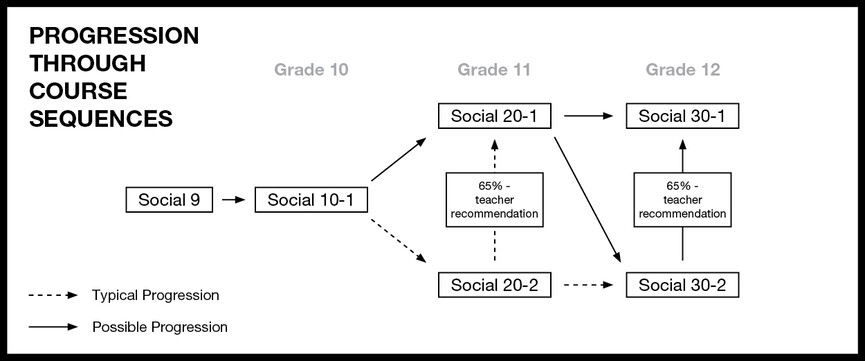“Social Studies is the study of people in relation to each other and to their world. It is an issues-focused and inquiry-based interdisciplinary subject that draws upon history, geography, ecology, economics, law, philosophy, political science and other social science disciplines. Social Studies fosters students’ understanding of and involvement in practical and ethical issues.” (Program of Studies, Social Studies K-12)
Social Studies
Social Studies 8
Grade 8 expands on the concept of intercultural contact and continues to develop historical-thinking skills through an examination of past societies in different parts of the world.Grade 8 students will examine issues related to contact between societies with differing worldviews. They will explore elements of worldviews and how these views are expressed by people living in different times and in different places. Through this inquiry, students will reflect on their own worldviews and assess the influence that the past has had on the present. Examples will be drawn from Japan, Renaissance Europe and Spanish and Aztec societies. For more information about Social Studies 8, refer to the Program of Studies.
Social Studies 9
Canada’s Opportunities and Challenges are studied. Students will analyze the relationship between Canada’s political and legislative processes and their impact on issues pertaining to governance, rights, citizenship and identity. Students will also explore issues of economics and their impact on quality of life, citizenship and identity in Canada and the United States. Grade 9 students write the Provincial Achievement Exam at the end of the course. For more information on Social Studies 9, refer to the Program of Studies.
Social Studies 10-1 (5 credits)
To what extent should we embrace globalization is the key issue for Social Studies 10. Students will explore the impacts of globalization on their lives, evaluate the impacts of historical globalization on indigenous and non-indigenous peoples, assess the economic, environmental and other contemporary impacts of globalization and explore their roles and responsibilities in a globalizing world. For more information about Social Studies 10-1, refer to the Program of Studies.
Social Studies 20-1 (5 credits)
Prerequisite: Recommended mark of 65% in Social Studies 10-1
To what extent should we embrace nationalism is the key issue for Social Studies 20-1. Students will explore the relationships among identity, nation and nationalism; assess impacts of nationalism, ultranationalism and the pursuit of national interest; consider impacts of pursuing internationalism in contemporary global affairs; and evaluate strategies for negotiating the complexities of nationalism within the Canadian context. For more information about Social Studies 20-1, refer to the Program of Studies.
Social Studies 30-1 (5 credit)
Prerequisite: Recommended mark of 65% in Social Studies 20-1
To what extent should we embrace an ideology? Students will explore the origins and complexities of classical and modern liberalism. An analysis of various political and economic ideologies will allow students to assess the viability of the principles of liberalism. Developing understanding of roles and responsibilities associated with citizenship will encourage students to respond to emergent global issues. This understanding will enable students to effectively investigate, analyze and evaluate government policies and actions and develop individual and collective responses to local, national, and global issues. For more information about Social Studies 30-1, refer to the Program of Studies.

